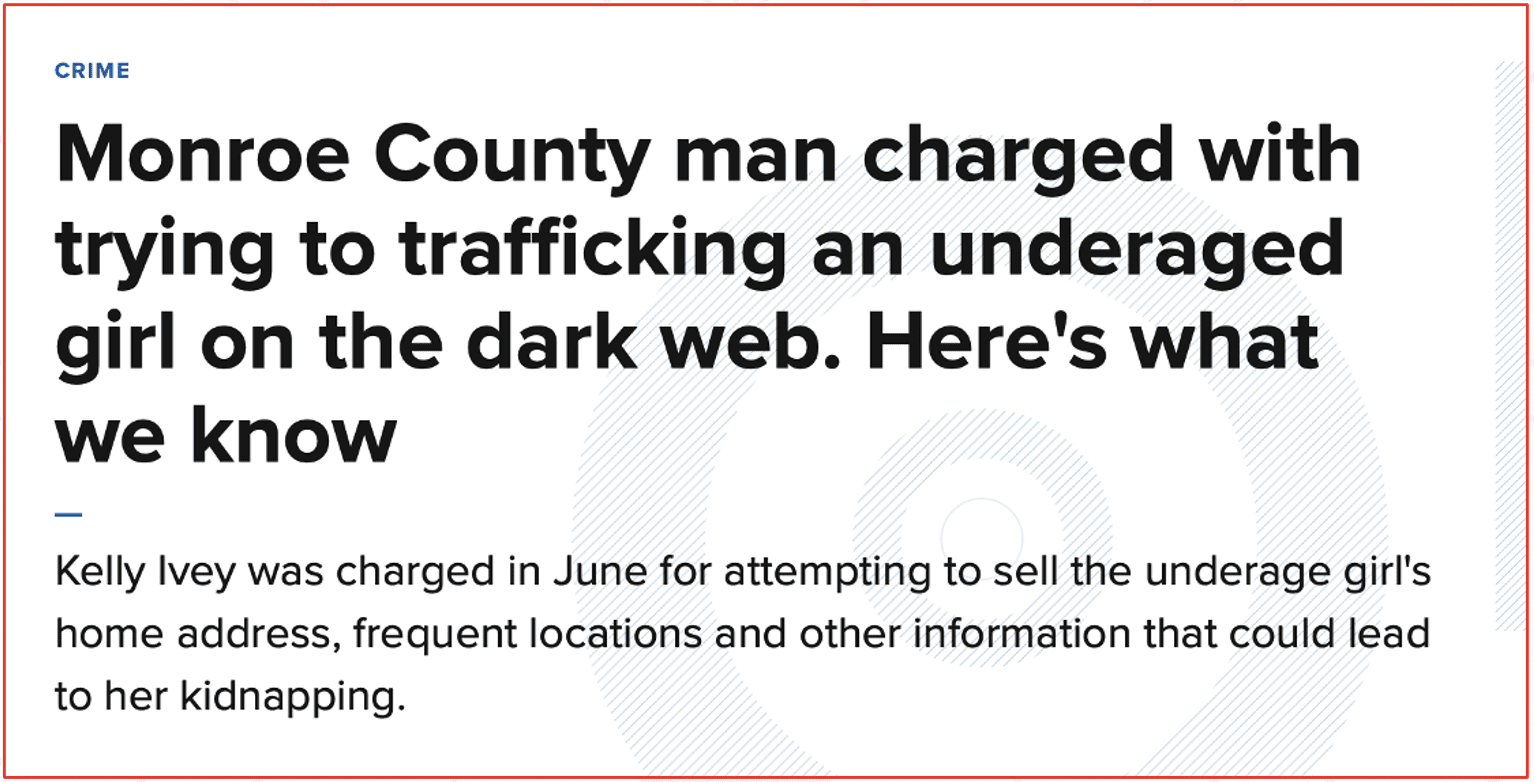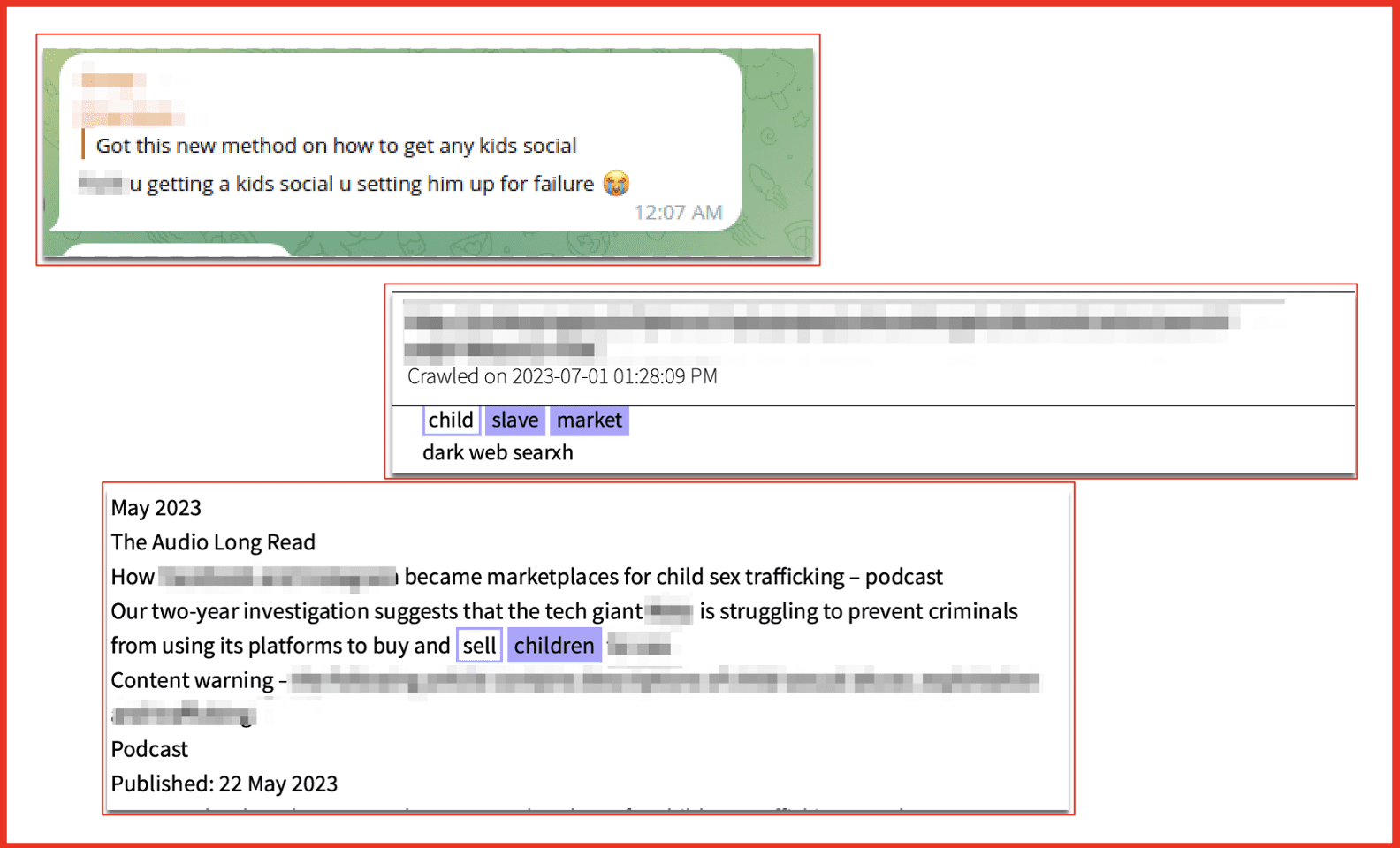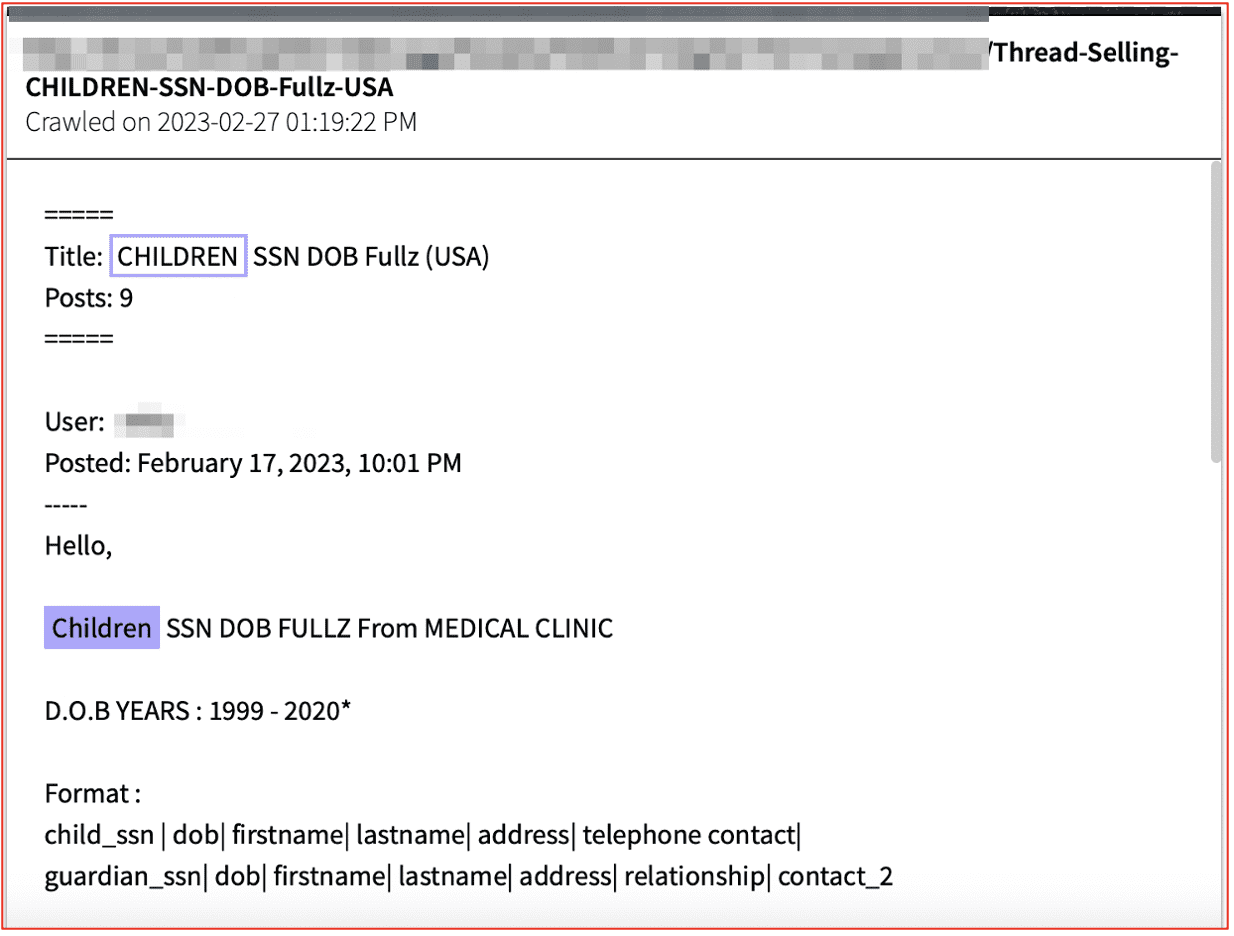[Webinar Transcription] Online Targeting of Minors & Child Extortion
November 28, 2023
Or, watch on YouTube
As the holiday season approaches and kids and young adults spend more time online, there is never too much to do to ensure they remain safe. In this webinar, DarkOwl and Mr. Bill Wacker share how a close family member of his was exploited online.
As the leader in dark web intelligence, DarkOwl constantly sees:
- Solicitation of minors and children, asking for pictures, personal information, and more
- Blackmailing the youth, threatening to extort them or reveal personal information about them or their families if they don’t comply with the requests of the actor
- Malicious actors posing as a younger individual in the hopes of luring children to meetup in person in order to carry out abduction or kidnapping operations
Mr. Wacker details his personal story about the family member who went through this, how he helped them, and what you and your family can do to keep children safe in an ever connected world that preys on them.
For those that would rather read the presentation, we have transcribed it below.
NOTE: Some content has been edited for length and clarity.
Bill: My name is Bill Wacker, I live in the Cleveland Ohio area and my daughter was affected by an almost child abduction. I wanted to talk about it because I don’t want this to happen to anyone else and would love to try to figure out ways to prevent this. If we can save one kid, that’s the goal for today and to inform everyone that it can be you, I know people say “not my kid, no way,” but it could be your kid, for sure.
Steph: I’m Steph Sample. I have 18 years of experience in various roles of cybersecurity. I started off focusing on the Iranian states as well as their allies in the cyber world, their cyber program, their developments, and then moved into all things criminal because the criminal world, as you’re about to find out, never ceases to stop, is always malicious, is always active, and we can do a little bit more and learn a little bit more to share with partners in the criminal world. So Bill again, cannot thank you enough for being here today. This is such an absolutely amazing story. So I think let’s jump right in so that we can educate our audience and share your incredible story that has a happy ending.
Let’s do that. So Bill, how was your family member approached? Can you please name specifically what social media platform? I think that’s important.
Bill: So it was Instagram. My daughter was involved. She’s always been a kid that didn’t have friends perse. She’s always struggled with her peer group. She’s never had trouble finding friends that are, you know, younger or hanging out with adults. It’s always bothered me and my inner mother. We’d catch her just talking to people here and there, and we just did our best to monitor it. But one day I was taking her back to her mom’s, and my partner at the time said, hey, I noticed something on Madeline’s phone that she was showing people and I would look at it if I were you. So I did. So we were driving home and not being a very good driver, I decided to look at the texting and Instagram exchange, and it only took a about three sentences for me to know that this was very serious, and I literally just did a U-turn and went right to the police station. I can tell you that the content… it was so awful. Use your imagination about the worst possible thing you could read from a sexual perspective, a sick sexual perspective. And think about it being said to a 12 year old kid.
Steph: That’s really important perspective. Because let’s be serious, the online world, whether it’s social media, gaming platforms, all of it is used and in a good way can help kids find people if they don’t relate at school, if they don’t have their peer group, that’s why they gravitate towards it. But then there’s these incidents and that’s absolutely atrocious.
Okay, so you had the observation – great vigilance on your on your partner’s part and getting involved. Did you approach your daughter about it? Did you message with the app?
Bill: Well, so she was with me in the car, literally. I asked her for the phone and she looked at me like, why? Because she knew something was up. And I said, I’ve heard that there’s some stuff on your phone that’s alarming, and I have to look at it. And I said, just please give it to me. Literally once I saw it, it’s the first couple sentences, it was off to the police station and getting them involved ASAP. I didn’t read everything, but what the police told me is it went down like a dialog. As they looked at the exchange, the next step was that this person wanted to meet her at a place called Crocker Park. It’s the largest shopping area in the Cleveland metro area, and it’s also a large child trafficking hotspot, which I didn’t know either until the police told us. It’s because of its location, proximity to the highway. It’s an outdoor mall. So the next step was he was trying to coerce her to meeting somewhere at Crocker. And I can’t, four years later, I still can’t believe it was that close. And it was just, it was a miracle we caught it. It really was.
The police got very involved, but they never caught him. They got an IP address. They worked on it for about four months, it just never worked out. We also had some visibility with the event with local channel 19. Tiffany Tucker was the anchor. She was a marvelous. She was so helpful, very involved, wanted to help out, wanted to bring the message to people in Cleveland. She’s fantastic. It’s a happy ending because nothing happened to her. But, you know, there’s trauma for her, there’s trauma for us. But we got over it. It’s. We’re just very lucky. I just want to make sure everybody knows that could happen to them. They’re tricky. They’re clever. They’re master psychologists. They know what they’re doing. You just got to be vigilant. And it will probably make your kids angry, but it just doesn’t matter. It’s a messed up world, as you’ll show later with some of the things that you’re going to bring up as slides.
Steph: So about how long, if you can give a ballpark, did the actors start speaking to your family member versus when you discovered it? Can you estimate?
Bill: Keep in mind, it’s like four years ago and I didn’t have the ability to go track the messaging, but I would say it was about a two month process.
Steph: It’s not that long, not a long time. And let’s be clear to your daughter was under 13, so she was a pre-teen, right? And you’re exactly right. That’s how these actors work. They know to go for younger, you know, the cognitive functions aren’t there. The social and the IQ not quite there. They’re just not developed. They [cyber actors] know what they’re doing.
So do you think that your daughter would have gone to meet in person?
Bill: Yes, absolutely. Well, let me take a step back. I mean, she’s 12 years old. But she would have had to figure out a way to get there. But she would have, because she’s very clever and she would have gotten what she wanted somehow. I’m just thankful that it never came to that. But yeah, I think she would have tried to figure out a way to meet.
Steph: You said that the location that the actor chose, the outdoor mall, is commonly used for child and human trafficking operations. Do you feel that there’s more awareness surrounding this venue now in your area, or would you like to call further attention to these which exist in every city?
Bill: I think that is a great question, and I don’t, I think the answer is probably no. People tend to forget these stories pretty quickly, unfortunately. I mean, with everything like gun control, everything it’s like goes away. We have so much coming at us. But yeah, I think it needs to definitely be brought up more. I don’t know how a mall like that would feel about putting fliers or signs up to, you know, if you feel like you’re in danger, call this number. That type of thing or text this if you feel like you’re being approached or I don’t know what to do.
Steph: That’s a really great point because airports have that, right. Let’s be serious. They’re usually in the restrooms or they’re in lounges, you know, a human trafficking number. Here’s something to call. Here’s a sign you can take.
So you mentioned that you you went to the police, which is great. Got the authorities involved. And you went to media, which I think is also great for calling attention. Do you have any recommendations as far as software monitoring for younger kids? I know there’s a privacy discussion, but look at what’s happening. Do you have suggestions on parental controls and monitoring?
Bill: I don’t at this point because we did have those tools and I guess we didn’t… I think the tool is only as effective as how you implement it or use it. And I’ll take the blame. I mean, she’s only with me a couple of days a week because we are divorced, but yeah, we just didn’t catch it and still have trauma. I beat myself up about it still, but we were able to catch her. But yeah, we did.
Steph: This is not to to beat yourself up over. This is important to reflect, to teach lessons. Because Bill, four years ago tech and social media weren’t what they are now. Let’s be serious. You know, there were issues. Of course we’re seeing that. But it evolves so much. And these kids, we just talked about how clever, how resilient, how intelligent they are. But, you know, parents have to try to stay one step ahead. And that’s impossible. So this is the point of this webinar, why we’re sharing what we want to educate.
How about her school Bill? We didn’t touch on that. Did you talk to her school afterwards? Did you share this news with other kids? How’s the school doing in this role?
Bill: School really didn’t do much. We told them, we notified them, but we really got nothing else out of them. I know the police were very frustrated that they just couldn’t find the perpetrator because the police that read the messages – you could just see the rage in their face, like when they read the whole thing. But no, we didn’t really get much out of the school. I think there’s talks at Westlake all the time about this. So not say that Westlake is not educated because they certainly have parent led discussions to prevent this from happening. But as far as this particular incident, I think there’s also a lot of shame, embarrassment, maybe from both parents and not telling many people outside law enforcement, you know, outside a particular close group of friends.
Steph: See, that’s another issue that we need to fix with public education because parents are not omnipresent. They can’t be everywhere. Neither is law enforcement. Neither are schools. Again, this is not a finger pointing exercise. It just goes to show with how quickly tech moves and how available it is, especially to kids. You know, we have to try to stay on top of it. We have to share our notes. We have to share our groups and share our resources because no one can do this alone, no one at all. So what would you hope the takeaway message is? Now having spoken to the media, law enforcement, the venue, schools, what do you want to tell our audience as far as how to address this in the future? Monitor their current kids activity. What are your thoughts there?
Bill: So I would sit down with your kid and and just have a just discussion about it. I would try to get educated as much as you can about what’s out there, what people are doing, and just have a discussion and just say, hey, have you ever had anything like this happen? Have you been approached? You’re the parents, parents know their kids better than anyone. And when something like this happens, make sure your kids are aware of it. Make sure your family is aware of it and your friends are aware of it. I don’t think there’s any silver bullet, right answer, I just think it’s really awareness. I think it’s trying to be involved as much as you can with your child, and then knowing that something might be off. You don’t know what it is, but you sense something’s off and you act upon that. That’s what happened here. That’s what saved us, is that something just seemed awry, off. And it’s you know, the analogy I use is everybody has a, you know, a pet. You know, when your pet’s sick, you just know something’s off with them. It doesn’t matter what. And I think the same is with your kid. You know something’s bothering them, on their mind if you have a good relationship. But it’s also embarrassing for them and scary for them. So I think the other thing is you have to make sure that whatever you tell them, whatever is going on, you’re a parent. We love you. We want to protect you. We want to help you. There’s nothing to be embarrassed about. These things happen. These people know what they’re doing. They’re psychopaths, sick people. And that’s all I can do. The biggest thing, Steph, is I wish I had better answers, but it’s just, it can happen to any of us. It can happen to any parent. It doesn’t matter.
I was hoping just to build a little bit more awareness, and I’m more than welcome to talk to anybody on this call if they want to just talk to me one on one, I’m more than happy. You can give them my contact information. But yeah, I just want to save a kid and prevent this from happening. It’s so awful for the family. It’s just it’s still tough to talk about four years later.
Steph: I believe it, I believe it, and that’s why we have to be thankful that you are here. You know, we talk to our kids about everything, right? There’s nothing else we haven’t done. So you have sex, drugs, alcohol, smoking. Now we have active shooter drills in schools. Right. So maybe there is something to be said there that we could get cyber drills in schools. It’s got to maybe start to be part of the curriculum because these kids have devices sometimes before they’re even out of the womb. They have social media accounts. And again, that’s not malicious activity on the part of the parents or family members, but they don’t know what they’re setting their kids up for. And you’re so right that awareness and education is the most essential part. So on that I have some slides I’d like to share.
Kathy: Before we move on, there’s a question for Bill. Now that your daughter is 16, how is your relationship about privacy and transparency between you, your co-parent and your daughter?
Bill: That’s a good question. I mean, obviously she’s 17, she’s a teenager. And communication can be tough. But I think she learned. We constantly talk to her about it because she’s still not socially mature for a 17 year old. So we have to be very, very careful about monitoring her still. And like I said, I’m only with her a couple of days a week, so it’s harder. And unfortunately it’s on her mom and mom’s busy as heck too, so it’s just really having the constant conversations. Fortunately, I don’t think fortunately is the best word to use, but she almost was taken and she got a second chance. Most kids don’t. And so it’s just keeping her aware, monitoring her very closely with my son who’s 12, the same age when it happened. It’s not a non-issue. It’s like he doesn’t have anything to do with this stuff. He’s got his circle of friends. That’s all he cares about. But he’s still, you know, aware and remembers what happened. I hope that answers the question.
Steph: So I pulled this news article up. Bill, you and I have discussed this before. This happened in Atlanta. It sounds a little bit similar in that it was the targeting of an underage girl.

The difference on this one, being in the huge part is that this individual was part of the parents social network approved, right? So they were friends on Facebook. They knew each other from a religious gathering. They thought that they knew what this guy was all about. And in reality, he was combing the parents accounts, the pictures of their daughter, her locations, to attempt to sell her online. There’s a dark web market. Obviously, we are DarkOwl – we know the dark web very well. The market is called slave market. It sells children from all over the world. It is not just the United States. So this is an example. Bill, you know, you talked about how when we see this, we have some headlines and then they go away. And you’re right because this was earlier in the summer of 2023. It was June. This little girl was also saved. She’s fine too. Happy ending like you Bill, her mom speaking out to the Atlanta press. But I think it’s more important to draw attention to that. And with that, I want to segue.
So again, DarkOwl, we comb telegram, discord. We are on the dark web. This is what we see and deal with all day. This is not easy subject matter.

My top screenshot is this individual who’s offering how to get kids social media accounts and sell them on telegram. Why? Because kids, even if you’re not going to physically go after them, right? Attempt to kidnaping, attempt to procure them, if you will. Kids social media is easy to steal their PII (personal identifiable information), passwords, credentials, because kids don’t have job histories, credit scores, all the complications that adults do. So this telegram channel is talking about how kids accounts are clean, and to steal an identity or start a criminal ring. That is what this actor is doing. He’s going after children.
You can see the middle one, which is again from the summer of 2023. We’ve got a child slave market. This is an offering on a dark web site. This is absolutely live. This was only a few months back. This is still happening.
And then we have a May 2023 article about certain tech marketplaces, platforms, all of it that are unfortunately criminals misusing to recruit, trap, approach and then attempt to buy and sell children, whether that’s kidnaping or another way. We’re not saying this is the tech giant’s fault. It’s just that this is happening everywhere, on every platform to kids as young as seven, eight, when they can start typing.
The final data and slide that I have here, which I thought was also really pertinent. Again, not going after physically attacking children or kidnaping them or taking them. This is a different dark market advertisement. Again, from 2023, you can see that the children’s social security numbers and dates of birth are available.

Fools in the cyber criminal world means that it’s a record with complete information. It means it’s the highest chance that you have to steal someone’s information. So these fools are going to have not only what the actor is listing, they will have locations, metadata, coordinates where they attend school, what sports they play, anything that can really help provide a complete picture for children for that identity theft. You can also see that they specified the dates of birth for these children are 1999 to 2020, again targeting those younger ages, those people who do not have the fully developed cognitive skills, who aren’t going to be able to understand that somebody online messaging them might not be who they say they are. And the final part of that post is you can also see that the guardians information, whether parent or other family member, other legal guardian is there, further allowing for a criminal actor to potentially impersonate a guardian and do further harm to that child or other children.
These are just some of the examples that we pulled. Again, we wanted to keep this focused on Bill and his family and the educational part of this, but we have to share how essential it is to protect your children online. Yes, everybody wants to share pictures and vacations and milestones. That is what unites us as human beings. We get it. But there is a dark, nefarious side to this. And unfortunately, criminal actors have really caught on how to quickly and efficiently and effectively make money off of innocent children or innocent families and do further harm. So I thought these were really important recent examples to share. Bill, anything else on these examples that you wanted to add? Did they approach her with any of this, or use any terms that you’d like to share as well? Lingo is important too.
Bill: No, I wish I knew. I just reading that and the other examples. It’s just horrendous. I just am speechless about the stuff that’s out there. I had no idea. I think it’s awareness. Like you said, technology has changed a lot in four years. Things change so quickly. So then it’s like you have to educate yourself on, well, all right, so this has changed. What am I going to do now? Keep pace I guess. I wish I knew what the answer was in terms of how to stop these people and how to find them. That would be, I would hope, our next breakthrough. I really thought we’d find that other person. We did not, I was surprised, actually.
Steph: It’s interesting that the actor wasn’t found because, you know that a lot of time and effort was spent on that. But it also goes to show that using location hiding software obfuscation techniques and then disposable infrastructure. Right now that we have cloud IP addresses, they’re ephemeral, you can change them. So these actors really do know that. And it’s terrifying how quickly they can disappear. We know they’re going somewhere else, we know they’re re-appearing elsewhere. So all right we’re going to try to get some schools and educations involved. We’re going to keep talking to the media. We’re always going to go to our respected law enforcement. Let them know. I think that vocabulary is one way that we can do this. You know, there are definite repeated terms that criminal actors will use. After we publish this, let’s have it in writing for people so that they can copy paste, put them into their parenting software, implement them live right. And then we can kind of keep a running list and also gain feedback from the audience. Undoubtedly, there are parents and cyber professionals in our audience who are going to watch this. So let’s keep that a growing task and list, which also facilitates continued conversation. We don’t want this to fall apart, fall away. We want to keep it visual.
Kathy: Bill, someone would like to know what was the response from Instagram. Did you get a chance to speak to them about the problem?
Bill: That’s a great question. I know we alerted them. I know the police took care of that. It made them aware of the problem. I can find out what Instagram went back and said. I know that they they did some things on their end, and I know the police were involved to try to figure out how to find them. That’s really all I know about what Instagram did. I kind of took my hands off it and let the police just do their job, as much as I wanted to take over.
Steph: That had to be hard to sit back and let someone else take action on this. But again, they were probably well versed, you know, so that had to be really difficult. And I think that’s a good point to share. There’s nothing about this process that’s going to be easy. It’s uncomfortable. It’s terrifying. It’s traumatic. So let’s focus on that too. And just really, you know, talk to your families about it, talk to mental health professionals too.
Kathy: Did the police have a cyber unit or only traditional investigation?
Bill: That’s a good question, too. Traditional investigation.
Steph: I want to highlight that should the FBI ever become involved, because these are definite cases for the FBI and your local law enforcement. But the FBI has a cybercrime not only unit and specialist, but they also have a reporting forum. You can use the hotline, you can use an anonymous email address. And I think that’s also important to share too. So that can be another thing that we provide in our follow up resources is not only your local law enforcement, but the FBI as well. Because if we have more eyes on this problem, we have just a little bit more monitoring and a movement towards a solution.
Kathy: I’m sure it may be difficult to have the data to confirm, but how often are these bad actors caught on the dark web in these instances?
Steph: I will be honest, not enough. I, in my almost two decade long career, know I’ve seen more ransomware, DDoS, more of the technical actors that are taking down, say, your critical infrastructure and I am not seeing enough attention given to nationally or internationally human trafficking efforts, kidnaping efforts that happen frequently online. And one thing I should highlight there, too, is the actors are also smart, right? So they are moving from the more common public forums on the dark web. They’re moving more towards one on one communications. So like in Bill’s instance, of course, it was private messaging on Instagram. What we’re seeing is a general trend is that they will advertise those keywords like you just saw in those slides I had. They will say children, they will say slave market, etcetera , etcetera. But there’s no further context or detail, and they entice people to message them directly, which of course hinders law enforcement operations. You can’t get into private messaging. So no, data’s not perfect. Maybe we can get some input from law enforcement too as we continue to drive awareness, but they are not being taken offline as quickly or as as needed.
Bill: And why is that? I was just going to say. Why do you think that? What do you think? What needs to be done to, in your opinion, to find these perpetrators or what other steps can we do? Because like you said, it’s hard to get them. We didn’t get the guy for my daughter. I know that dark web is very mean with Tor and everything is really hard, but I don’t know what your suggestions are.
Steph: It’s unfortunate that technology is is neutral, right? Technology is only good or bad, depending on whose hands it’s in. And like you said, it’s unfortunate that you didn’t catch yours. But like I detailed, they’re using all these hidden softwares, all of these obfuscation techniques, again, not just for human trafficking but criminal operations writ large. And that is unfortunately a really dark and nefarious side of technology, that if somebody is very sharp and knows what they’re doing, you can’t nab them, you can’t remove them. So I think all we can honestly do as hard or as ineffective as it might sound, because we’re people of action is continue talking about it, raising awareness, giving lingo, headbutting into your kid’s life. Right? Like, hey, who are you talking to? Who is that? Do you know that’s who that is? You’re not going to meet them in person, are you? Do it. There’s a really common thing in cyber where we do tabletop drills. So we do. All right. You got a DDoS attack. How do you bring your system back online? Go. Okay, you’ve got ransomware. Same situation. And unfortunately, it sounds like we’re just going to have to keep doing this with kids. Again, I think that curriculum in schools could be a good place to start. Do an impersonation in school off this, a person approached me online. He said this. He said that he asked for pictures and just try at age appropriate levels to make your kids aware in addition to parents, teachers and community members.
Kathy: Does DarkOwl help with detection of these issues?
Steph: Oh, my gosh, we certainly do. I mean, one of the numerous reasons I’m absolutely privileged to work here, not only do we contribute to criminal operations and stuff, but we also donate our platform to anti-human trafficking efforts. We have all of our coworkers who generally work nights and weekends to do that, because our executives feel it’s important. We at the analyst level feel it’s essential. I mean, look at what we just talked about, so we contribute to it. We will pass a tip information, we also love to share with other members of the cyber community. It takes everybody for the more technical criminals to be identified. We have partners that we would go to and say, what can you tell me about this IP address? Can you geo it? What can you do here? What can you tell me about this handle? Are they using a ProtonMail, an anonymous mail? Are they using Gmail? Do we have a chance to track it? Are they on any other platform aside from Instagram? Can you give me their handles on steam, Twitch, any gaming situations, right. So DarkOwl is definitely in the fight and that’s one of the reasons I’m just so unbelievably happy to be here and privileged to be speaking about this.
Kathy: Steph, you touched upon it a little bit, but interested in how this takes place in our public education curriculum. Back in the day, we were teaching Stranger Danger, and the participant is wondering if, you know, are we bringing these critical dangers from social media into the school setting?
Steph: You know, I don’t have kids in a school setting or a system. I don’t want to speak writ large to that. I’m sure that there are various areas of the country that are trying to take the don’t talk to strangers, don’t go into a white van, don’t take candy from strangers. I am sure that those efforts at certain levels are occurring, but what we need is a national, united one, right? We need a formal mandate to have this curriculum and have these teaching incidents in schools as well as, you know, a church, a mosque, a synagogue. Maybe you could touch on those community places on weekends or nights. Boy Scouts, Girl Scouts, I mean, the opportunities for education are endless. I don’t know of anyone that’s doing them minus individual grassroot efforts, but let’s build on it. That’s the point of this.
Bill: Going to the schools I mean, doing a national mandate. I don’t even know how to get started with that. But a local school, would you do a presentation, say to a school to talk?
Steph: Absolutely. We have parents here at DarkOwl who are definitely well versed and unfortunately are going to probably see these slides and lose a little bit of sleep. But yeah, I think starting at schools petitioning, you know, politicians to change the curriculum, implement these things, these are all potential ideas that we have. And whatever the community comes up with to add to and make them more robust, we’re all ears. Absolutely.
Kathy: In the dark web are there only sightings of individuals partaking in human trafficking? Or have you also seen movements by bigger criminal networks?
Steph: Oh, there are entire networks. There are absolutely networks. Generally speaking, what happens is much like every criminal conglomerate, they are set up like a business. So your lower level affiliates who maybe have that knack for speaking to younger children and attracting them, are sent out to recruit them. But then, you know, it’s horrible to say, but I have to say, you know, those lower level associates essentially have numbers that they have to hit. They have to get five kids a month, ten kids a month, right? Or else they face repercussions. So that’s the desperation into the criminal chain. One thing I’d really like to highlight is that internationally, because again, this is not just a United States problem. People from war zones are unfortunately horribly targeted, and that is generally by criminal networks. So they will say, okay, for $5,000, I will get you out of X war zone. Okay, here’s your passport. Here are your documents. Meet me at this location and we will transport you out. That is obviously not legitimate. It’s a huge criminal conglomerate. And I want to say that the money from human trafficking is only part of the criminal supply chain. The money that they pay for humans, children, women, boys, you name it, you know, they get that money from, say, online operations like ransomware, selling weapons in some cases. We’ve seen that in the Middle East and Africa. The funds from drugs, the funds from IEDs. Right. I mean, I spent two years in Afghanistan and was former military, and we’ve seen this criminal supply chain, and it is not any different than human trafficking is just another cog in that wheel. It is definitely networks, but it starts small with one individual going after their target and then it builds up.
Kathy: This may seem a little strange, but would you recommend that children say they are 18 on social media when they fill out the birthday sections? Would that make a difference or deter potential predators? If there are accounts that they’re older than they are, or would that be more harmful?
Steph: I would like Bill to take this one too. My input on that to start is that I don’t think they should misrepresent any ages because, listen, young women 20, 25, 18 are still victims of human trafficking. Very much so. It might change the way that they are approached, but I don’t think it’s going to deter them. Again, those actors have mandates and numbers to hit. And I don’t think that saying you’re 18 or 19, if you’re 13 or 14 is going to make a difference. Bill, how about you?
Bill: I don’t think it matters whatsoever. I think they don’t care, as Steph said. I mean, you know, you see signs everywhere about abduction in college bars. There’s signs everywhere that give a text code that if you feel like you’re in danger. But no, I don’t think it matters what age they have on Instagram. I mean, face it, my daughter should never have had this happen based on our age in the first place. I don’t think it matters at all.
Kathy: We hear that TikTok is being used very actively for targeting children. Do we have monitoring as part of this?
Steph: I can’t with with TikTok, I absolutely cannot – from where the data flows through to all of the dangers that have been identified to the types of media that’s on there. That is a personal choice. I scream at my nieces and nephews and brothers and sisters-in-law to get off TikTok. But that is a personal choice. And so that would have to be monitoring on the part of the parents guardians, etcetera, etcetera.
Bill: But what do you say to them to get them off? It’s like everybody. I’ve never used it. What do you say to them to prevent them? I mean, they’re kids. The peer pressure is intense just to share videos and such. It’s just that’s a tough one.
Steph: That’s a very tough one. DarkOwl does not work on TikTok as of right now. That would be part of social media, which we don’t really cover. So I would love to collaborate and have ideas as far as TikTok and how to protect its users, but that’s a that’s a really big conversation that’s happening in places. Right? I think there were a couple of efforts to block TikTok. They’ve gone back and forth. You know, obviously there’s some privacy issues there. Citizens would be up in arms. That is a very hard question, but it needs to be discussed. Absolutely.
Kathy: And our last question, Bill, kind of leads in a little bit to the peer pressure and the support. Thank you for your courage to share your story. How did your daughter’s friends react and support her and support themselves? Curious of the support?
Bill: It’s a great question because they didn’t know. They didn’t. We didn’t tell them. I’d say primarily because she really, at that time especially, did not have many friends, her age group. We definitely talked to my ex-wife’s closest friends. I know that they knew about it so they could talk to their kids privately. But yeah, it was a very private issue. It was very traumatic for her. It’s just having those conversations like organically as opposed to doing a big broadcast about it just because of the nature of it. She didn’t really have any friends to discuss it with. Just to be frank.
Steph: Bill, how about your you know, you mentioned your ex-wife’s friends in that community. And how about just the adults in your community? The adults at the school, were they more interested in paying attention after they found out what happened? The ones that you shared it with.
Bill: I don’t know because they’re not my friend group anymore. I would say knowing the women, I know they would have cared greatly and did everything they can to make sure that their kids and then their friends with their kids. I mean, they’re all good people. Everybody was horrified by it.
Steph: Yeah, and I think you’ve made a lot of new friends and garnered a lot of interest on this, Bill. So again, cannot thank you enough. Thank you for sharing your story.
Bill: I appreciate that. I hope I’ve answered all the questions. Well, I guess it’s four years ago and I feel kind of inept as I’m answering some of these questions because some of the details are kind of, it’s been a while and it’s kind of like blocked it off and now comes all roaring back. But I’m glad to do it just because I just want to help anybody I can. And I know you and Kathy, and Dustin’s mission is the same, so I’m more than happy to do this anytime and help anybody I can. If anybody ever wants to talk to me about it, just please let me know.
Steph: I’m going to wrap with, just thank you to everyone, Bill and the audience included. We are very much open to, you know, please contact us on LinkedIn, emails or anything. We want to continue this conversation. We want to have a follow up. And thank you for your time on a difficult subject for sure, but the holidays are coming up. This is why we timed it this way. When kids are off school and on their devices, let’s all just open our eyes a little bit more. So thank you all so much.
Dealing with a similar issue? Contact the FBI.
Explore the Products
See why DarkOwl is the Leader in Darknet Data
Products
Services
Use Cases















